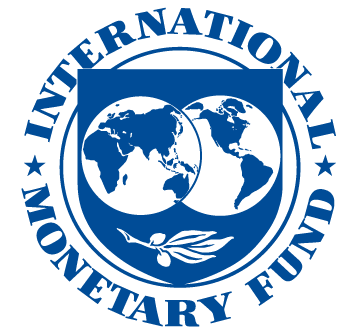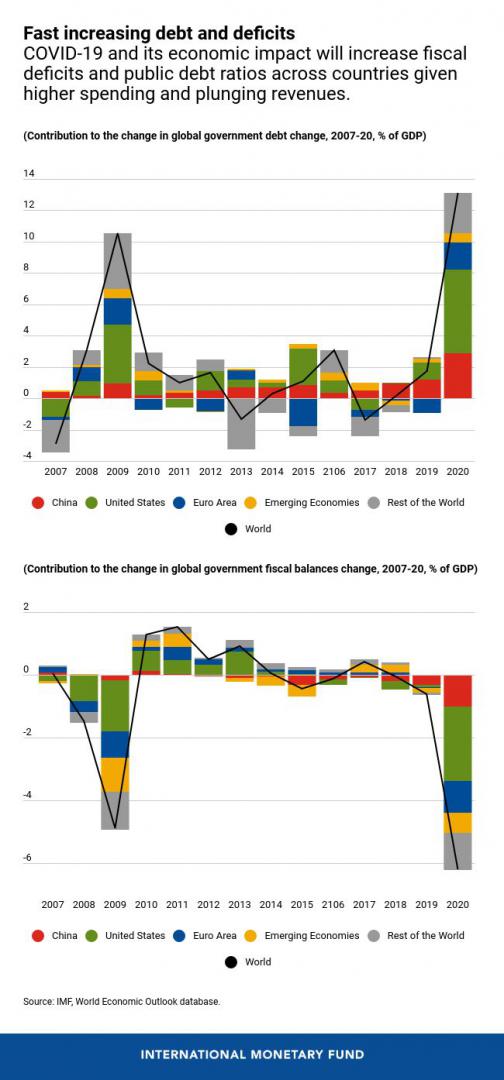In its recent publication, the IMF suggests the appropriate Fiscal Policies to contain and mitigate the damage from COVID-19.
In times of pandemic, fiscal policy is key to save lives and protect people. Governments have to do whatever it takes. But they must make sure to keep the receipts.
So far, countries have taken fiscal actions amounting to about $8 trillion to contain the pandemic and its damage to the economy.
Governments should do whatever it takes but make sure to keep the receipts.
 Emergency lifelines provided globally include higher spending and foregone revenues ($3.3 trillion), public sector loans and equity injections ($1.8 trillion), and guarantees ($2.7 trillion). The Group of Twenty advanced and emerging economies are at the forefront with actions totaling $7 trillion. Fiscal support is also provided by automatic stabilizers—features of the tax and benefit system that stabilize incomes and consumption, such as progressive taxation and unemployment benefits.
Emergency lifelines provided globally include higher spending and foregone revenues ($3.3 trillion), public sector loans and equity injections ($1.8 trillion), and guarantees ($2.7 trillion). The Group of Twenty advanced and emerging economies are at the forefront with actions totaling $7 trillion. Fiscal support is also provided by automatic stabilizers—features of the tax and benefit system that stabilize incomes and consumption, such as progressive taxation and unemployment benefits.
Rules of the road
There are three guiding principles countries should follow:
- Target support to households to ensure access to basic goods and services and to a decent standard of living. To avoid permanent scarring, target support to viable businesses to limit layoffs and bankruptcies.
- Deploy resources in a temporary and efficient way and reflect the costs in multi-year fiscal reports. Governments should reinforce principles of good governance commensurate with the scale of intervention. That should include, for example, accurate accounting; frequent, timely and complete disclosure of information; and the adoption of procedures to allow for ex-post evaluation and accountability. In a nutshell, policymakers should do whatever it takes but make sure to keep the receipts.
- Assess, monitor, and disclose the fiscal risks because not all measures will have an immediate effect on deficits and debts. For example, government guarantees extended on business loans may have no upfront costs but will fall on the government accounts if businesses fail to honor their obligations in the future.
Actions to save lives globally
To save lives, governments should finance additional health and emergency services as much as needed. But this is challenging.
- First, countries with limited health-care capacity cannot adequately scale up resources.
- Second, borrowing constraints in many emerging market and developing economies requires shifting expenditure toward the health sector while safeguarding social protection spending and vital public services (transport, energy, communications).
Global coordination will help achieve a universally low cost vaccine and medicine, and support countries with limited health capacity, including through aid, medical resources, and concessional emergency financing. As IMFs Managing Director said in her recent speech, the IMF stands ready to deploy $1 trillion lending capacity to assist member countries, with a focus on low-income developing countries.
Protect livelihoods with targeted fiscal measures
Social distancing necessary to slow the spread of the virus—with closed schools, restaurants, shopping centers, offices, and factories—inevitably carries economic costs. People and businesses need large, timely, temporary, and targeted fiscal support to remain afloat.
Countries’ institutional and financial capacity will influence the size of the lifelines they can offer along with the design and type of measures:
- Advanced economies can rely on a wide range of instruments on the spending, tax, and liquidity front to support people and firms given their strong tax-benefit systems. In the United States and Germany, for example, measures include extended unemployment benefits, including for the self-employed; payroll tax deferral; and wage subsidies to small and medium enterprises.
Many workers, small enterprises, and self-employed entrepreneurs struggle to pay bills, make debt payments, and keep people on the payroll. To help them, several European countries have rolled out liquidity lifelines such as affordable loans or guarantees. France and Japan are providing government-funded paid sick and family leave to those who are unwell, self-isolate, or have to stay home and look after children during school closings.
- Emerging market and developing economies typically have less room in the budget to respond. They face several shocks: the pandemic, a steep drop in demand from abroad for their goods and services, plunging commodity prices, capital flight, and higher borrowing costs in financial markets. Also, they have relatively less developed tax-benefit systems.
In those cases, in countries like India and Kenya, cash transfers made with the help of unique identification systems and digital technologies, or in-kind provision of food and medicine, such as in Bangladesh, are possible options. China offers temporary tax relief for the most-affected people and firms, including in transportation, tourism, and hospitality services. Full and timely value-added tax refunds can grant businesses access to much needed cash.
Facilitate the recovery with broad-based fiscal stimulus
As the pandemic abates and the Great Lockdown ends, a globally coordinated, broad-based fiscal stimulus may become an effective tool to foster the recovery. Coordination enhances the effectiveness of policy actions. But, at the same time, it has to respect relevant differences across countries, mainly in their financing capacity.
The pandemic and the associated Great Lockdown led to increases in debt and deficits beyond those recorded in the global financial crisis. As the pandemic abates and the economy recovers in 2021, public debt ratios are expected to stabilize at new—higher—levels. If the adverse scenario were to materialize, debt levels would be even higher and debt dynamics more unfavourable.





